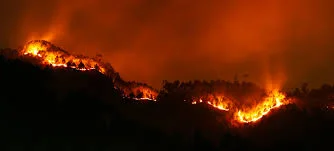On Wednesday, 18th May 2022, a blaze in the chilgoza forest of Sherani District in the Balochistan province of Pakistan started turning into a large scale wild fire. The forest nestled in the Koh-i-Sulaiman mountains gradually began to be consumed and burnt down by the expanding fire. The Provincial Disaster Management Authority (PDMA) along with the assistance of the National Disaster Management Authority (NDMA) launched a fire-extinguishing operation. Logistics, ground, and air support was facilitated by the Quetta Corps of the military.
Pakistan military’s media wing’s initial briefing informed about the fire being at an altitude of 10,000 feet high on mountain tops. This kept the residents in the near-by areas safe. The nearest village was reported to be 8-10 kilometers away from the sight of fire. Hot weather and dry winds were said to be the cause of the rapid spread of fire. After eight to nine days of fire-fighting efforts, the fire was brought under control and extinguished. An Iranian fire-fighting aircraft also landed in Pakistan at the Nur Khan Airbase to help in putting off the fire and this brought a successful end to the efforts of the fire-fighting mission.
The fire, however, affected and destroyed a major part of this ancient forest which was a source of livelihood to local people as well, apart from being an environmental asset. Though in a statement from a provincial minister, it was ensured that quick steps will be taken to help grow the forest back, but a major damage to a natural habitat has been caused by the wild fire. Pakistan’s neighbor, Afghanistan, expressed remorse and concern over the incident, while also hoping that the people of the area were saved from ‘human and financial losses.’




![Ukrainian and Russian flags with soldier silhouettes representing ongoing conflict. [Image via Atlantic Council].](https://southasiatimes.org/wp-content/uploads/2026/02/2022-02-09T000000Z_1319661209_MT1NURPHO000HXCNME_RTRMADP_3_UKRAINE-CONFLICT-STOCK-PICTURES-scaled-e1661353077377.jpg)

